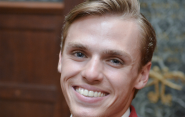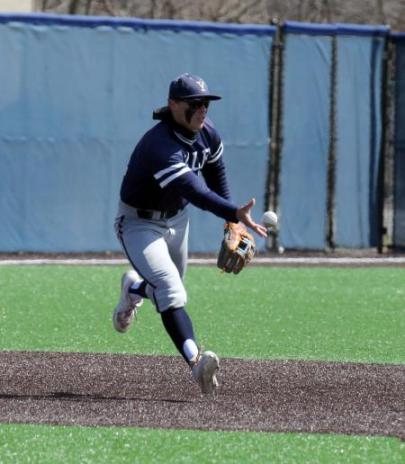Simon Whiteman '19 Starts His Career With the Giants

Weeks after Simon Whiteman '19 graduated with a degree in chemical engineering, the San Francisco Giants drafted him in the ninth round. Yale's baseball coach John Stuper has called the shortstop one of the hardest working players he's ever worked with. Not only did he end the finish with a .337 batting average and 34 stolen bases, but off the field he managed a 3.97 grade-point average and was nominated for a Rhodes Scholarship. The Trumbull, CT native is currently in South Carolina, playing for a Giants affiliate, the Augusta GreenJackets. Whiteman took time from his busy summer to talk with us about balancing studies and baseball, alternative energy and consulting with former Major Leaguer and fellow Yale alum (and fellow Trumbull native), Craig Breslow.
Congratulations on the draft pick! Where were when you found out?
I got a call a little bit before noon from the Giants and they said they were looking to take me the first day in the 8th, 9th, or 10th round. I heard the actual announcement on the draft as it was streaming. And then I got a call a little later from them congratulating me.

I was at home with my family. I was just kind of speechless. It was a lot of different emotions - gratitude for being given the opportunity, but excitement more than anything.
This must have been something that you'd long dreamt of?
Every kid growing up who steps out onto the T-ball field wants to get drafted and play in the major leagues. I think coming to Yale it's something that's less looked at, just because there's so much other success going on around here.
You graduated this year with a Chemical Engineering degree. What other career path were you considering?
I was looking into going into alternative energy - I'm mostly interested in solar energy and energy storage. I'd like to get an MBA one day and take that into the business sector. I think having a degree in engineering makes me a dual threat in that I understand the technology, but have the marketing skills to promote it commercially.
How did you get interested in chemical engineering and alternative energy?
Chemical engineering was just the blend of chemistry and physics. I was interested in chemistry from my first class in high school and the energy part came from being able to build something with it. And then I took a class in alternative energy at Yale. It was a grad school class up in the chemistry department and that really kindled my interest for me. I ended up graduating as part of the energy studies program.
Why energy?
It's just ubiquitous. You can't do anything without energy. It's part of our lives, from everything from transportation to the food industry and everything we do. Even on a human scale - moving around and exerting ourselves requires energy. And it's one of the driving forces that's going to shape our culture politically and economically in the future.
Engineering requires an analytical mind. Does that play a role in how you strategize for baseball?
We definitely spent a lot of time this year on analytics, looking at different pieces of data and creating graphs. I think coming from engineering and STEM background really helped me to get on board with that. I really love seeing the data behind things. I like understanding why we do what we do and engineering just made that so much more interesting for me.
So you're a Moneyball kind of player?
Yes, there's a lot more of that and I think, organization by organization. Everyone is gradually shifting toward that. I've only been here for a few days, but the Giants also seem to be very analytically tuned in. I think that's definitely the future for professional baseball.
How did your game change after coming to Yale?
I had some pretty incredible coaching from the time that I got here. Tucker Frawley, our associate head coach, is also the defense coach and he really revolutionized my defensive abilities. He turned me from someone with only one tool - that being speed - into a guy who can go out onto the field and shine.
Josh Schulman, our newest coach, changed my base-running game to help me steal 34 bases this year. And beyond that just committing to the weight room, each and every day. I was there five days a week this year, which allowed me to gain some strength and make some strides that enabled the rest of my game.
How did you balance your dedication to baseball with your school work?
I think it's just time management. I've always been a very structured and organized person and understanding the split between school and baseball really helped me. When I was back on campus, it was time to get my schoolwork done and when I was on the field it was time to get baseball done, and I didn't allow one to cross over into the other. I came to Yale and I did school and I did baseball and committed to my faith, and when you separate all of the other time outside those three, there really wasn't any.
Graduating with a Yale degree gives you a lot of options. Was there much decision-making in choosing baseball, or was it automatic?
I think it was a pretty easy decision. I talked for a while with Craig Breslow [former pitcher for the Chicago Cubs] who graduated from Yale a little while ago and had a very successful professional baseball career. The thing he said to me that really resonated was that baseball is a one-time opportunity and anyone who plays this game - whether they're the best player in the world or just happy to get on the field - gets the jersey taken off their back at some point. Nobody plays forever. This year I enjoyed going to the field more than anything. I can always go back into engineering, and I can always go back to grad school, whether I'm 25 or 55, but baseball is definitely something that ends one day, so I just wanted to make the most of these opportunities while I have them.

